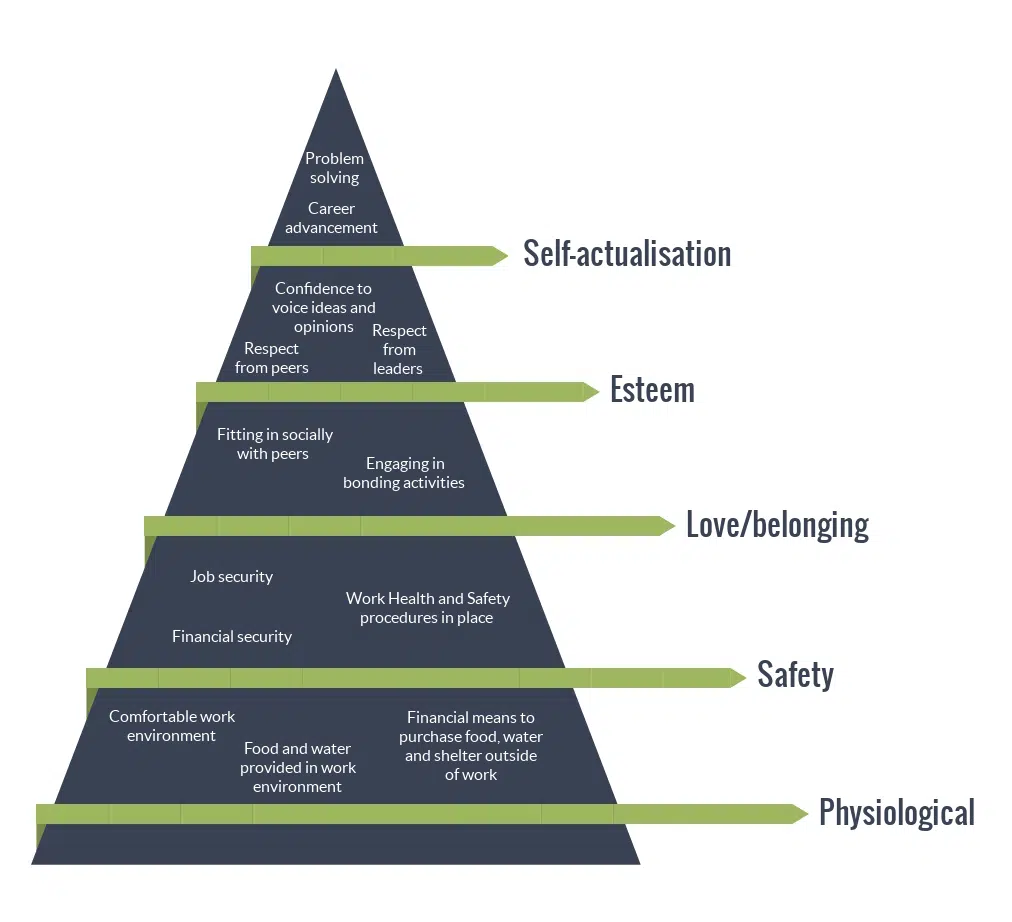There are plenty of theories out there about engagement and how to keep your employees performing at their best – it’s a hot topic at the moment as a new generation comes through the workforce. They care a little less about what they’re paid and more about whether their work fulfils them and, if their needs aren’t being met, they simply leave. So, how can you find out if you’re meeting your employees needs?
The great news for everyone is that the hard work has already been done. Way back in 1943, Abraham Maslow published his paper “A Theory of Human Motivation” in which he introduced his hierarchy of needs. His hierarchy was split into 5 sections: physiological needs, safety needs, love/belonging needs, esteem needs and self-actualisation needs. By working up the pyramid and satisfying each of the needs, humans can be satisfied, successful and content.

So how does Maslow’s Hierarchy help you to battle disengagement? It’s as simple as making sure that each of the levels from the pyramid are covered. If any of needs on any of the levels of the pyramid are not being met within your organisation, it’s likely that your employees are at risk of becoming disengaged.
How can an unmet need turn into disengagement?
An employee who feels as though they are not respected (at the esteem level of the pyramid) may turn inward and become reluctant to contribute. The more they refuse to contribute, the more the feeling will grow. There is also a possibility that they become angry at feeling as though they aren’t respected and they may lash out.
Both results leave employees not engaging positively with their work, with their leaders or with their peers or simply not engaging at all. Even though esteem is at the higher end of the pyramid, an unmet need at that end, no matter how minor it may seem, can be the seed in a case of disengagement.
Most managers focus on meeting the physiological needs and safety needs at the bottom of the pyramid. Of course, these are the most fundamental needs that humans have, so it makes sense to ensure they are sufficiently covered but too often, the belonging, esteem and self-actualisation levels are considered unimportant. This is simply not true – especially in a work environment.
Ensuring that employees feel as though belong among their peers, have the confidence to share their opinions, are respected and have the opportunity to be challenged in their work are all extremely important factors when it comes to engagement.
It makes sense to start using Maslow’s Hierarchy as a guide to meeting your employee’s needs. In our own lives, we know how important it is to feel respected and confident in our choices and those things are no less important for the employees in our organisations.
************
Greg Weiss is one of Australia’s most renowned career coaches. He is the author of “So You Got A Job, WTF Is Next”. The book prescribes a proven, practical 7 step guideline for new employees so they succeed, rather than fail their probation periods and beyond. Find out more about the book at https://www.wtfisnext.wtf/
He is the Founder and Director of Onboff an online training and coaching platform that helps HR specialists, coaches and recruiters to deliver exceptional onboarding and offboarding experiences for employees.
Greg also hosts The Keep: The Employee Experience podcast and runs CareerSupport365.


